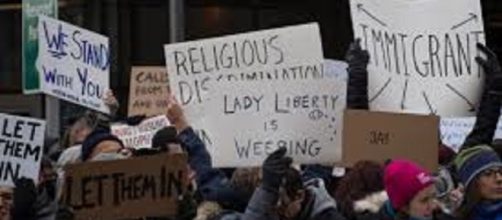President Donald Trump's efforts to curb immigration received a setback on Thursday after a federal appeals court allowed thousands of refugees who had been temporarily stopped from moving into the US by the travel ban into the country. According to The New York Times and Reuters, the presiding judge also upheld an earlier ruling by a lower court that had given relief to grandparents and other family members as a result of Trump's controversial travel ban.
Limitation on travel ban receives approval
Pro-refugee organizations hailed the decision by The United States Court of Appeals for the Ninth Circuit, which gave temporary classification on who is affected by the travel ban.
In June, the US Supreme Court allowed Trump's travel ban - which targeted people from six Muslim-majority countries and all refugees - to be implemented, while the court mulled over arguments over whether such an order complied with the American Constitution. However, the court ordered US authorities to let visitors and refugees with legitimate relationships with any person or entity in the United States into the country. The court did not adequately define the meaning of that particular ruling.
In defining the June court ruling, the United States government said it covered immediate family members and in-laws, but not other relatives such as uncles, aunts, cousins, or grandparents. The government also stated that the ruling exempted refugees whose sole connection to the United States was the immigration agency that was trying to find ways to resettle them in the US.
However, in July, Derrick K. Watson, a federal justice in Honolulu rubbished the government's interpretation, forcing authorities to launch an appeal to the US Court of Appeals for the Ninth Circuit.
The Trump administration will launch an appeal
In the appeal, lawyers appearing for the US Justice Department stressed that only parents, children, in-laws, and siblings could fall under the category of close relatives. However, the three Judges of the Ninth Circuit upheld Justice Watson's decision. In a 37-page opinion, the three Ninth Circuit Judges who were all appointed by former United States President Bill Clinton said that the government did not offer a satisfactory argument on why a mother-in-law is considered a bona fide relationship, but other relatives are not.
The three judges also stated that working with a resettlement organization fulfills the requirements of being considered bona fide. A Justice Department spokesperson said that the government would appeal the Ninth Circuits decision. During his presidential campaign, Donald Trump promised that should he get elected, one of his first duties in office would be a crackdown on immigration into the United States. After assuming office, Trump signed an executive order banning immigrants and refugees from six Muslim-majority countries including Iran, Libya, Somalia, Sudan, Syria, and Yemen from entering the United States.


